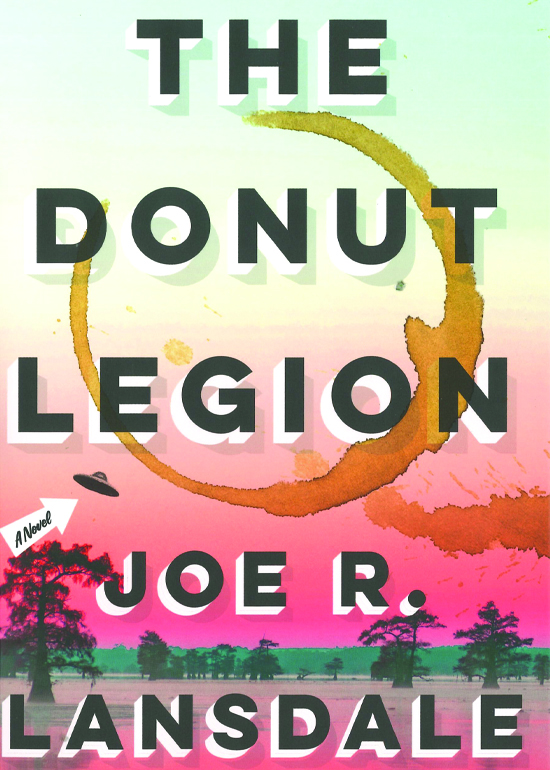Donut Worry, Be Happy

The Donut Legion: A Novel
By Joe R. Lansdale
New York City: Mulholland Books, 2022.
304 pp. $28 Hardcover.
Reviewed by
Cheyanne Clagett
Set in rural East Texas, Joe R. Lansdale’s latest novel The Donut Legion, follows writer Charlie Garner as he investigates the Saucer People, a UFO cult similar to Heaven’s Gate that has sunk its probes into May Town’s population through the popular donut shop it manages. The novel, opens with Charlie having a vision of his ex-wife Meg, who warns him against eating omelets and asks him to investigate her possible murder. As Charlie and his older brother Felix begin their search, they stumble upon a more disturbing mystery: the role of leading cult members in fraud, assaults, disappearances, and unsolved murders. Having recognized the Saucer People’s menacing schemes, Charlie and company try to defuse the cult before it’s too late to save the town. Populated by vivid characters in a world of heightened realism and hijinks, The Donut Legion takes a Looney Tunes approach to the question of why people cling to religion and, at times, delusion.
Because of this cartoonish absurdity, the novel is as fast-talking and fast-paced as an action-adventure screenplay. The dialogue is snappy, pushing the story forward, building on inside jokes, and revealing character all at once. The following conversation between Charlie and a vision of Meg is a good example of the lightning-fast dialogue:
“‘What’s the thing about omelets?” I asked. ‘Watch out for them.’ ‘Did you bring your car this time?’ ‘I came on the wind.’ ‘There isn’t any wind.’ ‘I came on the wind, Charlie. Are you going to find me?’”
The novel’s chapters are equally quick, with the average being six pages and the longest around twelve. As a result, each chapter is a burst of energy. This pacing supports the story as a crime novel since it avoids indulgent rambling and stone-faced seriousness.
Vivid, complex side characters heighten the story’s absurdity through Lansdale’s quick, memorable descriptions. For example, Lansdale introduces Grover, a retired cop and ex-cultist, in two well-chosen lines: “He was bald except for a circle of hair around his temples that looked like a brown ring inside an uncleaned toilet” and “For him to have carried [the package] upstairs was akin to a donkey with broken legs trying to wiggle his way up a greased playground slide.” This physical frailty then maps onto Grover’s disappointment in himself for falling for the Saucer People’s ideology. With only two descriptions, Lansdale indicates both Grover’s physical and mental state. Police Chief Nelson has a similarly striking entrance. Charlie characterizes him as “a man who constantly battled constipation” and notes “what looked like a mangy beaver or perhaps a possum in disguise or a disintegrating hairpiece” sitting on the chief’s desk. However, right after setting up a somewhat stereotypical character, Lansdale subverts the audience’s expectations of him with the chief’s comment about taking his grisly dog to Starbucks to get a Puppuccino. Even though these are side characters, Grover especially, their appearances are flashes of humor and unexpected humanity that invite the reader’s investment.
The novel suffers, however, from uneven politics, veering between liberalism and objectifying its female characters. Throughout the novel, both Charlie and Felix reassert their position as progressive white men in a conservative, rural region. For instance, when thinking about an antagonist’s pet, Charlie says, “‘There are people these days who would vote for Cowboy’s chimpanzee if it wore a Trump cap.’” While the brothers speculate about how the police will react to their investigation, Felix says, “‘Course, we’re not Black, so they might not shoot us right away. They might give us white guys a warning.’” Despite this attempt to be politically aware and critique Texas’s political climate, the novel reveals a strong male gaze through its dialogue and characterizations of the women. For example, Felix describes his dynamite, high-powered attorney girlfriend as “Cherry of the excellent dark skin and more excellent brain.” Grover tells the group that “‘the Woke Police might parachute in and whip me, but I’m going to say it: I never minded looking at her either. She’s easy on the eye.’” Cherry’s intelligence and competence are evident as she investigates alongside the brothers and protects them from their own brashness, and these descriptions undercut the strength of her character by focusing on her appearance. The minor female characters are not exempt from the male gaze either. Upon meeting Meg’s landlady, Charlie thinks, “There was something about her face that made you think that she had lived her life in a dirty room full of cigarette smoke…She had an unconcerned attractiveness about her in spite of that dingy life impression.” The first half of the description is evocative; the second half lamely summarizes what Charlie has already said. Because the novel criticizes the state’s politics and culture for being too conservative, the problem of the male gaze stands out and sharply contrasts the liberalism it attempts to establish.
Although the novel struggles to treat its female characters fairly, The Donut Legion is still a funny, engaging read about a small town’s descent into delusion. With its rapid pacing, snappy dialogue, and whacky characters, the story turns a familiar premise into a kaleidoscopic absurdity that delights readers expecting an easy resolution and a simple crime novel. Stay away from omelets; don’t eat the donuts; but do read The Donut Legion for a satisfying exploration of UFO-induced psychosis over the hills in East Texas.
Cheyanne Clagett is an MFA fiction student at Texas State University and the Editorial Fellow at the Center for the Study of the Southwest.
